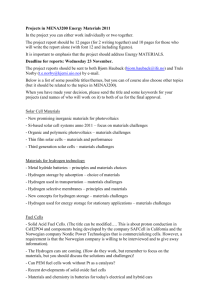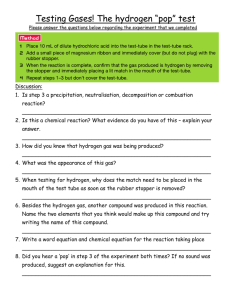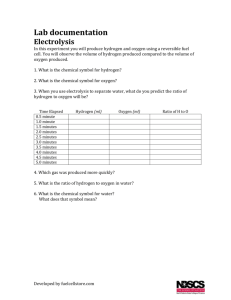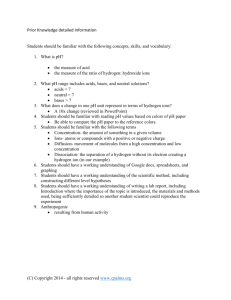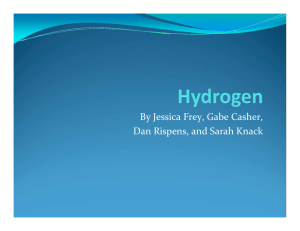Hydrogen Project The Science City Research Alliance
advertisement
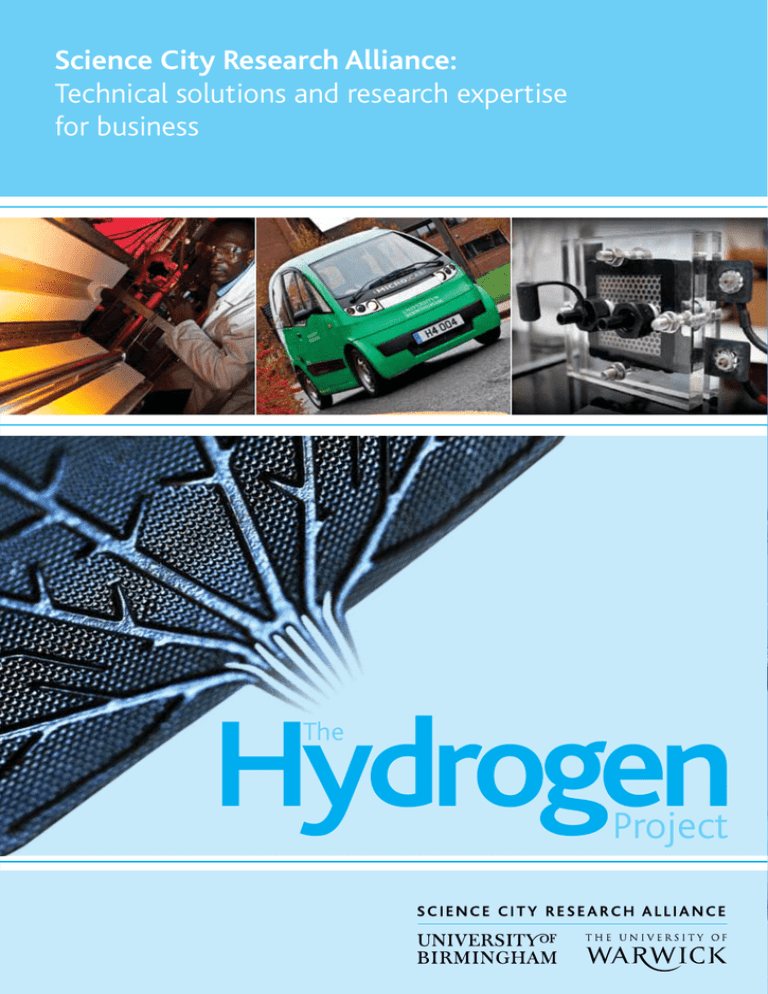
Science City Research Alliance: Technical solutions and research expertise for business Hydrogen The Project Providing access to the latest thinking, training, research and state-of-the-art scientific equipment Who we are The Hydrogen Project, part of the Science City Research Alliance (SCRA) programme, covers all aspects of hydrogen research, from generation, fuel cells and storage, to economics and policy. The Hydrogen Project The Hydrogen Energy Project seeks to develop and commercialise new processes and technologies for the sustainable production, storage and utilisation of hydrogen as an energy vector in fuel cells to reduce carbon emissions. The Hydrogen expertise can be categorised as follows: T he Hydrogen Materials Group in the School of Metallurgy and Materials at the University of Birmingham has over 35 years’ experience in the investigation and exploitation of hydrogen interactions with materials. The laboratory has state of the art equipment, allowing a large number of techniques to characterise hydrogen storing materials. Engineers have also developed a zero emission canal boat, powered by a rare earth magnet motor, Polymer Electrolyte Fuel Cell (PEFC), and metal hydride store technologies. The project was in collaboration with British Waterways and is used to demonstrate and raise awareness of the practical applications of hydrogen. n The Hydrogen Project is part of the Energy Futures programme, a key part of a larger investment in the research infrastructure of the West Midlands region, uniting the Universities of Birmingham and Warwick in the Science City Research Alliance (SCRA). The investment encourages the collaboration of academic and industrial research, through the use of the latest equipment in the field. The Hydrogen Storage Group in the n School of Chemistry at the University of Birmingham has an extensive programme dedicated to the discovery and synthesis of hydrogen storage materials. The aim of the group is to develop materials for hydrogen storage in fuel cell vehicles. The School of Chemical Engineering n at the University of Birmingham is well recognised for its dynamism and expertise in Fuel Cell Technologies, and collaborates with over 60 companies regionally and nationally, The aim of the Science City Research Alliance is to proactively e as well as having strong links with Europe, Canada, the USA and Japan. Academics in the School of Chemistry and Chemical Engineering are collaborating in the development of new materials for fuel cell electrodes and Solid Oxide Fuel Cell membranes. The University of Birmingham works n in collaboration with the Midlands Energy Consortium to run the UK Doctoral Training Centre in Hydrogen, Fuel Cells and their Applications. The Centre trains 10 PhD students per annum carrying out research in industry. This project is in turn linked to an EPSRC funded project which is training 50 PhD students over five years. The Unit of Functional Bionanomaterials n in the School of Biosciences at the University of Birmingham has been working in the field of biohydrogen production and waste treatment for over 15 years. The group has developed a technology for hydrogen production from wet organic waste streams that combines fermentation and photofermentation. The group has access to facilities which include twin 100 litre pilot-scale fermentation systems with online gas analysis. Such technology can reduce the waste streams by up to 90%, producing only clean biohydrogen, which can then be used in fuel cells for the generation of electricity. Access the expertise of the leading n academics in their field Collaborative Research n Work with University experts to develop your R&D. Access to equipment, expert n personnel and training for staff Joint opportunities for n research funding Support in developing joint proposals. Researchers within Chemistry at n Warwick University have experience and expertise in the design and use of catalytic materials that are capable of generating hydrogen gas from small molecules, including waste materials such as glycerol, formic acid and carbohydrates. The Warwick Chemistry Group also n works on catalysts for the transfer of hydrogen between organic molecules, which can be employed for the synthesis of high value materials (e.g. pharmaceutical components) from low-value ones (e.g. small alcohols). The Hydrogen and Fuel Cell n Research Group at the University of Birmingham focuses on four main projects: Solid Oxide Fuel Cells, Fuel Cell Applications and Modelling, Polymer Electrolyte Fuel Cells and Hydrogen Production. SCRA’s offer to business Seminars, workshops and briefings n Facilitating knowledge exchange by communicating the latest research technologies and innovations, creating a stronger bond and a working conduit between the company and the University. The potential for involvement n in PhD research projects and the opportunity to access internships/placements Licensing n Access to University Intellectual Property. The Warwick Materials Solid State n NMR Group undertakes a large portfolio of research spanning areas such as energy materials, catalytic materials and surfaces, glasses and bioglasses, and many systems underpinned by organic, organometallic, transition metal and rare earth chemistry. encourage industrial-academic collaboration and joint research Case studies United Utilities Water United Utilities (UU) is one of the UK’s largest water companies. It provides water and wastewater services to nearly seven million people in the North West of England, supplying nearly 2 billion litres of tap-water a day. UU’s assets include 22 anaerobic digestion plants where sewage sludge is converted to biogas (methane), which is burned to generate clean sustainable energy. This is used to reduce the energy needed in the sewage treatment processes and has potential to allow export to other users. Until recent times sewage sludge was considered a waste to be disposed of but today it is recognised as a valuable resource. As well as energy there is scope to recover materials such as phosphorous and other elements, some of which are becoming scarce. UU has teamed up with one of the University of Birmingham’s spin-out companies, Biowaste2energy, and its associates, Sustainable Resource Solutions, to examine the feasibility of increasing energy generation from waste using the Biowaste2energy process. EADS Innovation Works & RCUK (Unmanned aircraft) The feasibility study concluded that UU could reduce its overall spend on grid electricity by up to 15% and avoid an estimated maximum of 63 million kg CO2 emissions per year using the new technology. WRAP (the project funder) will be publishing the feasibility report in full for Autumn 2012. As part of the group’s objectives, EADS is determined to improve eco-efficiency across its products and its industrial processes. With this in mind, EADS Innovation Works partnered with the University of Birmingham to research and develop the incorporation of a Solid Oxide Fuel Cell (SOFC) stack into an unmanned aerial vehicle. Research, led by Dr Waldemar Bujalski at the University of Birmingham, has investigated the performance of a SOFC by recording steady-state current, voltage and power outputs. The initial results have showed reassuringly strong, fast performance, indicative of a suitable cell for use in vehicles. Future work will seek to adapt the design for optimal performance on hydrocarbon fuels. EADS is a global leader in aerospace, defence and related services with a workforce of over 133,000, including more than 17,000 employees in the UK. The project is ongoing but already a new way of making cathodes which are more environmentally friendly has been established, and a UK patent application is pending. Dedicated experienced Business Engagement Managers facil Heineken UK Heineken is a major international brewer that encompasses many popular brands (e.g. Heineken, Foster’s, Bulmers Cider). Brewers are active in minimising their CO2 emissions, including those from the fermentation process along with the costs for disposal of process wastes (e.g. spent grain or apple pomace). Heineken has therefore teamed up with the University of Birmingham to investigate potential solutions for both these issues. The University’s School of Biosciences carried out research into potential uses for the spent grain. Researchers found that it could be treated with hot compressed water to release fermentable sugars and demonstrated efficient biohydrogen production using these new sugars as the raw material. Results using spent grain were subsequently published in the Bioresource Technology journal (2012). Before this discovery, the waste-tohydrogen bioreactor and the CO2-tofoodstuff bioreactor would have to take up separate spaces meaning that less could be achieved on limited available ground area. Whereas ‘beam-sharing’ enables an integrated, efficient CO2-abatement and waste-to-hydrogen system. “We set out to investigate how we could reduce and utilise our CO2 emissions in innovative ways. This work showed that the science and techniques were possible. Combining all this together we recognised the further potential for an integrated bioreactor to improve our efficiency and reducing cost. At this early stage further development will be required to bring the bioreactor to market. I am grateful for the expertise in the School of Biosciences accessed through the SCRA Hydrogen Project, which highlighted the exciting potential.” Richard Heathcote, Sustainable Development Manager, Heineken UK Limited A secondary interdisciplinary project looking into brewery CO2 showed that it can provide the carbon source for high-value edible microbes called Spirulina. It also found that Spirulina can share the same space as the hydrogen-producing bacteria using a new ‘beam-sharing’ technique being published in the Biotechnology Letters journal (2012). litate interaction between businesses and academics A strategic union between two of the leading research Universities in the Midlands - the University of Birmingham and the University of Warwick Our expertise n Low Carbon Challenge Materials for Hydrogen Storage n Hydrogen Fuel Cell Technology n BioFuels n Waste to Energy n Electric/Hybrid Vehicles n The Science City Research Alliance The Science City Research Alliance (SCRA) is a strategic union between two of the leading research universities in the Midlands, the University of Birmingham and the University of Warwick. The Alliance was formed under the Birmingham Science City initiative and has benefited from a multi-million pound investment by Advantage West Midlands (AWM) and the European Regional Development Fund (ERDF) in the technology areas of Advanced Materials, Energy Futures and Translational Medicine. With an investment of nearly £20 million the programme has unrivalled expertise in both nano and bulk functional materials and processing. The state-of-the-art equipment and facilities available to business are applicable to a vast range of problems in materials research. Energy Futures n Meeting the low carbon challenge affects us all. How we develop energies for the future will be critical to meeting this challenge. The Energy Futures programme focuses on a range of specialist areas in the low carbon landscape including - hydrogen power, waste to energy, biofuels, powertrain technologies and energy efficient technologies. The investment has funded joint equipment and research infrastructure at both institutions, as well as specialist personnel such as Technical Facility Managers and Business Engagement Managers who have considerable industrial experience and expertise and will guide businesses through each stage of the engagement process. The principal aim of SCRA is to engage with business and industry - giving access to the latest research and state-of-the-art equipment in science and technology. Advanced Materials n The Advanced Materials programme has expertise to cover everything from materials synthesis, analysis and characterisation through to processing and device fabrication. An investment of £20 million in infrastructure and equipment has enabled us to capitalise on the two universities’ expertise and research into cardio vascular disease, infection, metabolism, neuroscience and reproduction, establishing the West Midlands as one of the major centres for clinical trials in Europe. We have invested £17.2 million in new equipment and facilities which has created a unique opportunity for businesses to work with us on collaborative research in this developing field. nTranslational Medicine Translating experimental research into a direct patient benefit is a key issue for the medical sector. Two vital components in this process are advanced equipment (including new buildings) and clinical trials. For all information and enquiries please contact: University of Birmingham businessteam@bham.ac.uk T: 0121 414 3898 www.birminghamsciencecity.co.uk/research-alliance SCRA is working in partnership with many companies across the UK and overseas, such as Jaguar Land Rover, Eon, ITM Power, Microcab Industries, River Simple and EADS. SCRA also assists SMEs in the development of their own technologies and improving products and processes.

